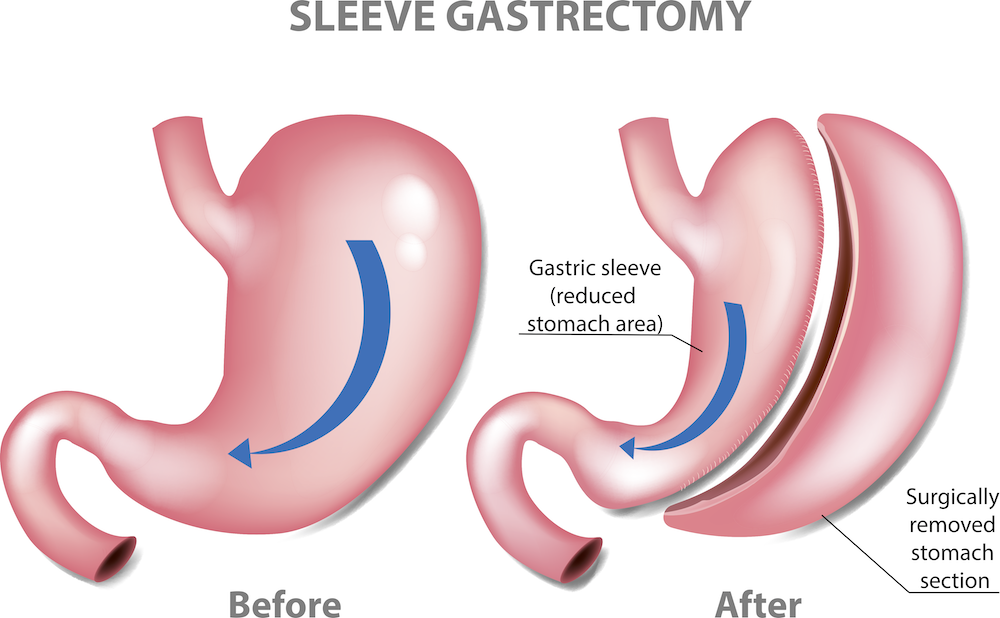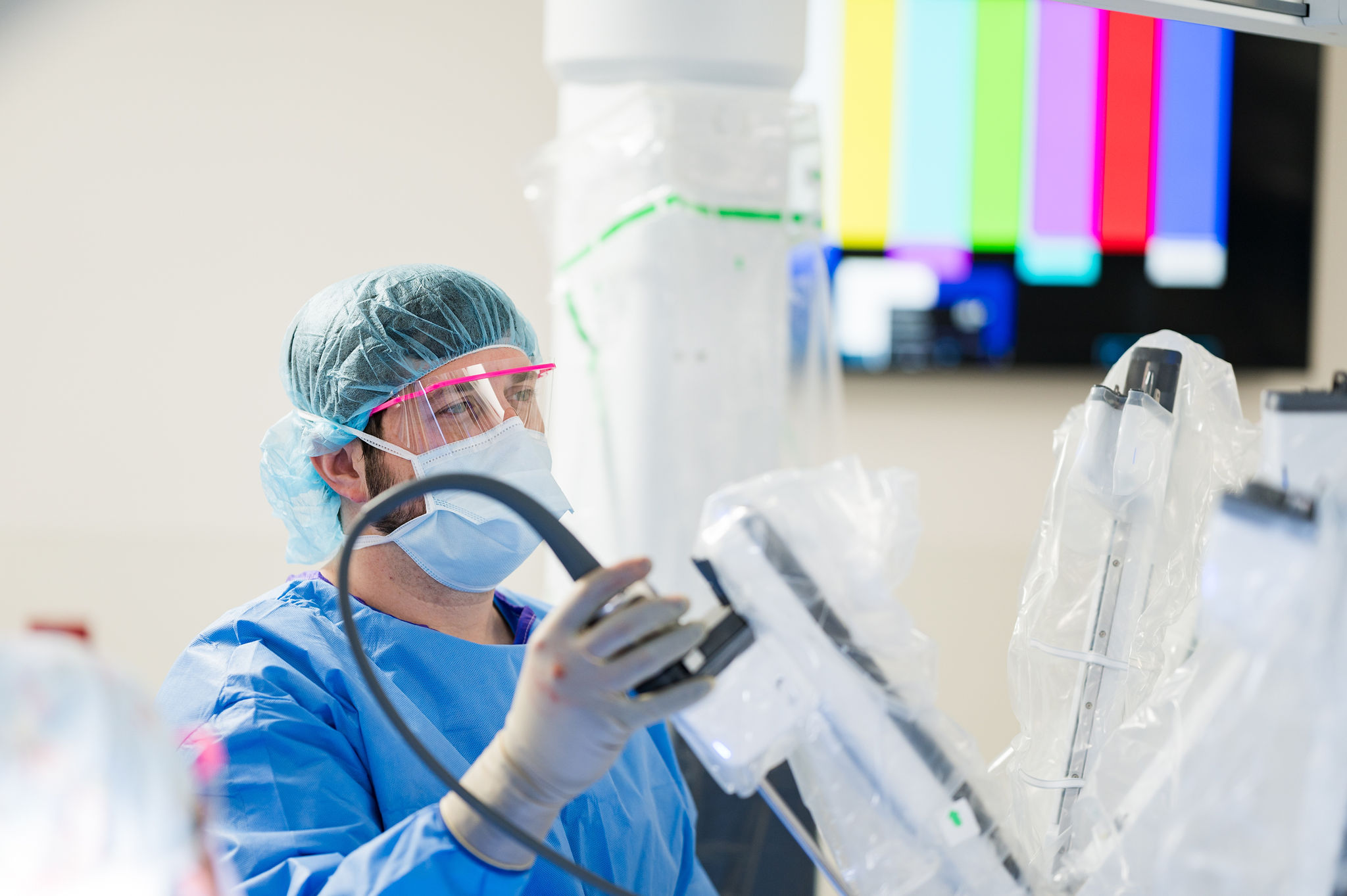VERTICAL SLEEVE GASTRECTOMY
VERTICAL SLEEVE Gastrectomy
Vertical →
SLEEVE GASTRECTOMY
Vertical sleeve gastrectomy is a pivotal weight-loss surgery that significantly alters the stomach’s size, paving the way for substantial weight reduction. The transformative procedure helps in shedding excess weight while also playing a crucial role in enhancing the overall quality of life for those with various obesity-related health conditions.
Today, we’ll look into the intricacies of sleeve gastrectomy, shedding light on its benefits, the surgical process, candidacy, lifestyle adaptation post-surgery, and the journey toward recovery.
Skip to Benefits, Understanding the Procedure, Who is a Candidate, Recovery, FAQ’s.
Benefits Of
SLEEVE GASTRECTOMY
SIGNIFICANT WEIGHT LOSS
Patients typically experience a remarkable weight reduction, losing as much as 60-70% of their excess weight within the first two years
Read More
following surgery. Patients maintain this substantial weight loss by adhering to a healthy lifestyle.
IMPROVED CONDITIONS
The surgery has a profound impact on obesity-associated ailments. Conditions such as type 2 diabetes, high blood pressure, and obstructive
Read More
sleep apnea often see significant improvement or even complete resolution following the procedure.
MINIMALLY INVASIVE
Performed laparoscopically, sleeve gastrectomy involves small incisions, leading to a quicker recovery, minimal scarring, and reduced
Read More
discomfort compared to traditional open surgeries. For many patients, this option is more approachable.
Significant Weight Loss
Patients typically experience a remarkable weight reduction, losing as much as 60-70% of their excess weight within the first two years following surgery. Patients maintain this substantial weight loss by adhering to a healthy lifestyle.
IMPROVED CONDITIONS
The surgery has a profound impact on obesity-associated ailments. Conditions such as type 2 diabetes, high blood pressure, and obstructive sleep apnea often see significant improvement or even complete resolution following the procedure.
MINIMALLY INVASIVE
Performed laparoscopically, sleeve gastrectomy involves small incisions, leading to a quicker recovery, minimal scarring, and reduced discomfort compared to traditional open surgeries. For many patients, this option is more approachable.
Understanding the Prevalence of →
Gastric Sleeve Surgery?
Gastric sleeve surgery is the leading type of weight loss surgery both in the United States and across the globe. It accounts for over half of all bariatric procedures performed annually in the U.S.
In numbers, around 150,000 gastric sleeve surgeries occur each year in the U.S. Globally, approximately 380,000 procedures are completed annually.
However, despite its popularity and proven benefits, only about 1% of individuals who are eligible for and could greatly benefit from the surgery actually undergo the procedure. This underscores a significant gap in the utilization of this effective weight loss solution.
Duration of →
Gastric Sleeve Surgery?
Gastric sleeve surgery, also known as sleeve gastrectomy, is known for its relatively concise and straightforward procedure compared to other bariatric surgeries. Typically, the surgery lasts between 60 and 90 minutes. This brevity makes it an attractive option for many seeking weight loss solutions.
Despite the short duration of the operation, you may still need to plan for a hospital stay. Expect to remain in the hospital for one to two days afterward. This stay allows healthcare professionals to manage post-operative pain and monitor any temporary side effects like nausea.
The overall experience is designed to be as smooth as possible, ensuring your recovery is monitored carefully.
What Happens Before →
Gastric Sleeve Surgery?
Preparing for gastric sleeve surgery involves a series of steps designed to ensure your safety and maximize the procedure’s effectiveness. Here’s what you can expect:
- Health Screening
Initially, you’ll undergo a comprehensive health evaluation. This helps determine if you’re a suitable candidate for the surgery and involves various tests to assess your overall health and readiness. - Two-Week Liquid Diet
Once approved, you’ll embark on a two-week liquid diet. This diet is crucial for shrinking fat deposits in your abdomen and liver, which makes the surgical process safer and more manageable for the medical team. - Pre-Surgery Fasting
As the surgery date approaches, you’ll be instructed to abstain from eating or drinking for at least 12 hours prior to the procedure. This ensures your stomach is completely empty, which helps prevent any complications, such as adverse reactions during surgery.
These preparatory steps are essential in minimizing risk and enhancing the likelihood of a successful outcome. Your medical team will be there to guide you through each phase, so keep their guidelines close at hand and follow them meticulously.
What Is →
Sleeve Gastrectomy?
Sleeve gastrectomy involves bariatric surgeons removing approximately 80-85% of the stomach, transforming it into a slender, sleeve-shaped organ. This drastic reduction in stomach size naturally limits food intake. It also diminishes appetite, primarily due to decreased ghrelin, the hunger hormone.

Who Should Consider →
SLEEVE GASTRECTOMY?
ARE YOU A CANDIDATE?
Ideal candidates for vertical sleeve gastrectomy are patients who have a Body Mass Index (BMI) of 40 or more, as well as those with a BMI of 35-39 who also suffer from severe, obesity-related health conditions, such as diabetes or heart disease. The procedure is also an option for individuals who may not be eligible for or are interested in other weight-loss surgery for various reasons, including insurance limitations.
HEALTH CONSIDERATIONS
Beyond BMI, surgeons evaluate overall health, psychological readiness, and the commitment to lifelong dietary and lifestyle changes when considering a candidacy for sleeve gastrectomy.
Pros →
Significant Weight Loss
Gastric sleeve surgery helps patients achieve substantial and sustained weight loss by reducing the stomach’s size, limiting food intake, and promoting early satiety. At Nashville Bariatrics, our team provides personalized pre- and post-surgical support to ensure long-term success and a healthier lifestyle.
Reduced Hunger
By removing the part of the stomach that produces ghrelin, the hunger hormone, gastric sleeve surgery naturally decreases appetite and cravings. The specialists at Nashville Bariatrics offer expert guidance on nutrition and lifestyle changes to help patients develop sustainable, healthy eating habits.
Digestive Tract Preservation
Unlike gastric bypass, the sleeve gastrectomy preserves the natural function of the digestive system without altering intestinal pathways. This reduces the risk of complications related to malabsorption, and at Nashville Bariatrics, we prioritize patient safety and long-term digestive health.
Minimally Invasive Laparoscopic Surgery
The gastric sleeve procedure is performed using laparoscopic techniques, which require only small incisions, leading to less pain and a faster recovery. At Nashville Bariatrics, our skilled surgeons specialize in minimally invasive procedures to help patients return to their daily routines as quickly and comfortably as possible.
Improving Obesity-related Health Conditions
Losing excess weight through gastric sleeve surgery can significantly improve or even resolve conditions like type 2 diabetes, high blood pressure, sleep apnea, and joint pain. The medical team at Nashville Bariatrics is committed to enhancing patients’ overall well-being through comprehensive care and ongoing support.
CONS →
Surgical Risks
All surgeries come with some risk of complications. In the case of gastric sleeve surgery, these complications occur in less than 1% of operations, but they can include bleeding, infection, reactions to anesthesia, and leaking from the staple line.
Non-Reversible
Unlike some other bariatric procedures, the gastric sleeve is not reversible. Once the surgery is performed, the changes to your stomach are permanent.
Dumping Syndrome
This can occur when food moves too quickly from your stomach to your small intestine, causing symptoms like nausea, vomiting, or diarrhea.
Possible Long-Term Complications
After recovery, some individuals may develop long-term issues. Scar tissue might narrow the stomach, causing nausea and difficulty eating. Nutritional deficiencies are common, as it’s harder to consume enough nutrients, necessitating lifelong nutritional supplements. Additionally, some might experience gastroesophageal reflux or develop gallstones due to rapid weight loss, potentially requiring further treatment or surgery.
Commitment to Lifestyle Changes
Success after gastric sleeve surgery demands a significant commitment to lifestyle changes, including diet and exercise. This is essential to maintain weight loss and overall health post-surgery.
Is the →
GASTRIC SLEEVE SAFE?
When considering gastric sleeve surgery, safety is often a top concern. Generally, this procedure is considered safe, especially compared to the health risks of obesity and its associated conditions.
Lower Risk Levels
Gastric sleeve surgery typically presents fewer risks than many routine surgeries, such as gallbladder removal and hip replacement. This is largely due to its minimally invasive nature, which usually involves laparoscopic techniques. As a result, patients experience less post-operative pain and benefit from quicker recovery times.
Minimally Invasive Advantages
The minimally invasive approach also reduces the likelihood of complications. Smaller incisions mean a lower chance of infection and reduced scarring, making it a preferred option for those seeking bariatric surgery.
Comparative Safety
It’s important to remember that while all surgeries carry some level of risk, the risks associated with the gastric sleeve are generally lower than the long-term health dangers posed by untreated obesity. As always, discussing potential risks and benefits with a qualified healthcare provider is crucial for making an informed decision.
FAQ’s About →
VERTICAL SLEEVE GASTRECTOMY
Recovery from sleeve gastrectomy involves a phased approach, starting with a liquid diet and gradually transitioning to solid foods. Patients typically return to normal activities within a few weeks, while full recovery may take a few months.
During the initial recovery period, which generally spans about a month, it’s common to experience fatigue or tiredness as your body heals and adjusts to a reduced-calorie intake. Here’s what to expect:
- First Weeks: You’ll begin with a liquid diet, essential for allowing your stomach to heal.
- Progression: Gradually, you’ll move to a soft diet, introducing more variety as your body adapts.
- Solid Foods: Eventually, you’ll transition back to a regular diet, though this process is slow and intentional to ensure your digestive system adjusts properly.
This structured dietary progression not only aids in recovery but also helps patients adapt to their new lifestyle, promoting long-term success.
Post-Surgery Follow-Up
After the surgery, you’ll have frequent check-ups with your healthcare provider. These visits are crucial for monitoring your weight loss progress and assessing any related health conditions. Your provider will also keep an eye on potential side effects to ensure everything is on track.
Lifestyle Adjustments
To support your recovery and maintain weight loss, it’s essential to adhere to specific lifestyle guidelines. Your healthcare team will provide guidance on nutrition, exercise, and overall wellness, helping you take good care of yourself during this transformative journey.
By combining medical supervision with personal commitment, patients can achieve successful long-term outcomes after gastric sleeve surgery.
WHAT EXACTLY DOES SLEEVE GASTRECTOMY INVOLVE?
Sleeve gastrectomy transforms the stomach into a tube-like structure by removing a large portion, significantly reducing its volume. This alteration limits food intake and helps decrease appetite, aiding in weight loss.
Here’s a more detailed look at the process:
- Preparation and Anesthesia: Your surgeon will administer general anesthesia to ensure you’re comfortably asleep throughout the procedure.
- Initial Incision and Expansion: A small incision, about half an inch long, is made in the abdomen. Through this opening, a port is inserted, and carbon dioxide gas is used to expand the abdomen for better visibility and access.
- Visualization with Laparoscope: A small lighted video camera, known as a laparoscope, is introduced through the port. This device projects real-time images of your internal organs onto a screen, guiding the surgeon.
- Additional Ports and Tools: One to three more incisions are made to insert additional ports. These allow the use of long, narrow surgical tools necessary for the procedure.
- Reshaping the Stomach: The surgeon measures and sections off the gastric sleeve using a surgical stapler, effectively transforming your stomach into a smaller, sleeve-like shape.
- Completion and Closure: The excess portion of the stomach is removed, and the incisions are carefully closed, completing the surgery.
By understanding these steps, you gain a clearer picture of how sleeve gastrectomy facilitates weight loss by physically altering your stomach’s capacity and reducing hunger signals.
WHO SHOULD CONSIDER THIS PROCEDURE?
This procedure is ideal for individuals who are significantly overweight, especially those with a BMI over 40 or a BMI over 35 with obesity-related health issues.
What are the INSURANCE AND SELF-PAY OPTIONS?
While many insurance plans cover sleeve gastrectomy, coverage can vary. Many surgical centers offer self-pay options and financing plans for those without insurance or whose plans do not cover the procedure.
WILL MY STOMACH RETURN TO ITS ORIGINAL SIZE POST-SURGERY?
The stomach can stretch slightly over time but cannot return to its original size. Maintaining healthy eating habits is crucial to prevent significant expansion.
CAN THE PROCEDURE BE REVERSED?
Since the surgeon removes a portion of the stomach, the procedure is irreversible, underscoring the importance of careful consideration and commitment to lifestyle changes.
HOW QUICKLY WILL I LOSE WEIGHT AFTER THE SURGERY?
Weight loss varies, but many patients lose as much as 50-60% of their excess weight within the first two years, depending on adherence to dietary and lifestyle recommendations.
CAN I BECOME PREGNANT AFTER UNDERGOING SLEEVE GASTRECTOMY?
Pregnancy is possible post-surgery, but it’s advisable to wait at least 18 months to ensure the body has stabilized and satisfies the mother and baby’s nutritional needs.
HOW WILL THIS SURGERY AFFECT MY EATING HABITS?
Post-surgery, you’ll feel satiated with significantly smaller portions, which encourages healthier eating habits and contributes to weight loss.
Learn More About →
Surgical Technique
Using laparoscopic techniques, surgeons make small incisions and insert surgical instruments and a camera for guidance. This method significantly lowers the risk of complications and speeds up the recovery process.
OTHER WEIGHT LOSS SURGERIES
Unlike gastric bypass, which reroutes the digestive tract, sleeve gastrectomy maintains the original path of the digestive system, minimizing nutritional deficiencies. The sleeve is a more permanent alternative than gastric bands, eliminating the need for future device adjustments.
ROLE IN REDUCING APPETITE
Bariatric surgeons remove the portion of the stomach that produces most of the body’s ghrelin; sleeve gastrectomy effectively decreases the patient’s appetite while facilitating a lower caloric intake and promoting weight loss.

Lifestyle Changes
Recovery from sleeve gastrectomy involves a phased approach, starting with a liquid diet and gradually transitioning to solid foods. Patients typically return to normal activities within a few weeks, while full recovery may take a few months.
DIETARY ADJUSTMENTS
Patients should adhere to a structured diet following surgery, starting with liquids and slowly incorporating pureed and solid foods. This gradual progression allows the newly formed stomach sleeve to heal correctly.
IMPORTANCE OF EXERCISE
Regular physical activity is crucial post-surgery, aiding in weight loss and maintenance, improving cardiovascular health, and enhancing mood and energy levels.
ONGOING SUPPORT AND MONITORING
Follow-up appointments are essential for monitoring recovery, nutritional intake, and weight loss progress. Many patients also benefit from joining support groups and counseling to navigate the emotional and psychological aspects of their weight loss journey.
Post-surgery dietary and exercise guidelines play a significant role in the patient’s healing and the long-term success of the surgery. Be sure to ask your surgeon if you have any questions about sleeve gastrectomy.
Schedule a Consultation →
Nashville Bariatrics
At Nashville Bariatrics, we understand the emotional and physical struggles that come with trying to achieve lasting weight loss. Choosing Vertical Sleeve Gastrectomy is a significant and brave step towards a healthier life, and our dedicated team is here to support you every step of the way. We provide compassionate, personalized care to ensure that you feel confident and well-informed throughout your journey. Don’t wait any longer to take control of your health—schedule a consultation with us today and discover how Vertical Sleeve Gastrectomy can help you achieve your weight loss goals and improve your overall well-being.

Bariatrics Clinic
615.425.0550
393 Wallace Rd Ste 301, Bldg A
Nashville, TN 37211
M-F 7:30 am - 4:30 pm








